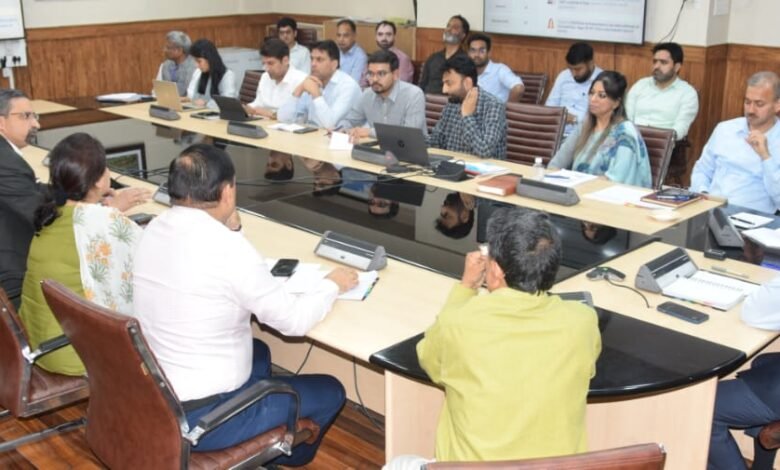CS scrutinizes strategy for effective implementation of Mission YUVA

SRINAGAR, JUNE 18: Chief Secretary, Atal Dulloo, today chaired a comprehensive meeting to assess the implementation of Mission YUVA, a flagship initiative aimed at fostering entrepreneurship and employment in Jammu & Kashmir.
The meeting, attended by senior government officials, Vice-Chancellors and representatives from leading financial institutions like IIT Jammu, IIM Jammu, NABARD and J&K Bank, focused on accelerating the mission’s ambitious goals while Deputy Commissioners participated virtually.
The Chief Secretary expressed satisfaction with the progress on online application submissions for Mission YUVA. He asked the Deputy Commissioners to intensify awareness campaigns at the district level and establish robust institutional frameworks to assist the applicants. He emphasized the importance of consistent monitoring of applications and timely convening of District Level Implementation Committees (DLICs) for swift case approvals.
Dulloo asked the experts of BISAG-N for developing the dashboard which would give a peek into working of the YUVA portal and its utilization by different stakeholders and the applicants.
Addressing the J&K Bank, Dulloo recommended designating a senior administrator to oversee the Mission YUVA operations. He also instructed their branch managers to conduct weekly visits to Block-level Business Help Desks (BHDs) to guide the applicants in developing effective business proposals for swift loan sanctions.
The Chief Secretary also sought and received assurances from the universities, national institutions, NABARD and NIFT to dedicate their human and material resources towards capacity building for the applicants, transforming them into successful future entrepreneurs.
Secretary, Labour and Employment, Kumar Rajeev Ranjan, while highlighting the Mission YUVA’s objective, said that it aims to establish J&K as a thriving hub of enterprises and holistic employment. The mission targets creation of 1,37,000+ new enterprises and 4,25,000+ employment opportunities. He explained that the implementation strategy has been built upon four key pillars: Culture, Capital, Capacity Building and Connectivity (4Cs), designed to accelerate employment avenues in J&K. The “Culture” pillar focuses on motivating the individuals and creating an enabling business environment.
Moreover, extensive “Udhyam Jagriti” awareness campaigns have been conducted across J&K, utilizing social media, mass media, outdoor advertising and panchayat-level outreach. So far, 2,086, out of 4,291 panchayats, have been covered, reaching nearly 98,700 individuals. The goal for this phase is to cover 90% of the panchayats and reach 2 lakh individuals.
A subsequent phase involved sensitization for a baseline survey to ensure better data capture. Recently, the “Jagriti 3.0” campaign launched on May 15, 2025, has already resulted in the reception of 8,189 loan applications.
The “Capital” pillar focuses on providing fixed and working capital support. The government will offer a 5% interest subsidy on bank loans. Micro-loans up to ₹5 lakh will be collateral-free, supported by CGTMSE credit guarantee and accessible to first-time entrepreneurs aged 18-59 without educational or income barriers.
For existing MSMEs, the scheme offers loans up to ₹5 lakh for Micro, ₹30 lakh for Small and ₹75 lakh for Medium enterprises. Beneficiaries can avail 80% of the total project cost as a loan, with a 20% self-contribution required.
The “Capacity Building” pillar focuses on equipping the entrepreneurs and employees with the skills to run sustainable businesses. This included institutional support for Detailed Project Report (DPR) framing.
Furthermore, Small Business Development Units (SBDUs), Business Help Desks (BHDs) and YUVA Doots will provide end-to-end support, from motivating potential entrepreneurs to assisting with document uploading and other necessary help. Two business acceleration hubs will be established in Srinagar and Jammu, alongside 20 SBDUs at the district level and 80 BHDs at the block level, supported by approximately 1,000 volunteers.
Finally, a market linkage framework will be extended to these entrepreneurs once their units become operational, improving reach, export and trade opportunities for business growth.





